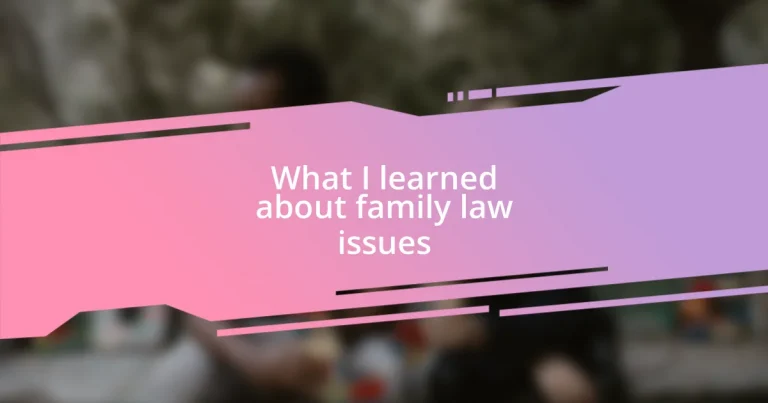Key takeaways:
- Family law fundamentally addresses emotional and legal aspects of family relationships, including divorce, custody, and support issues.
- Legal representation is crucial for navigating family law challenges, providing both knowledge and emotional support during complex situations.
- Effective dispute resolution strategies, such as active listening and mediation, can help families manage conflicts and maintain healthier relationships.
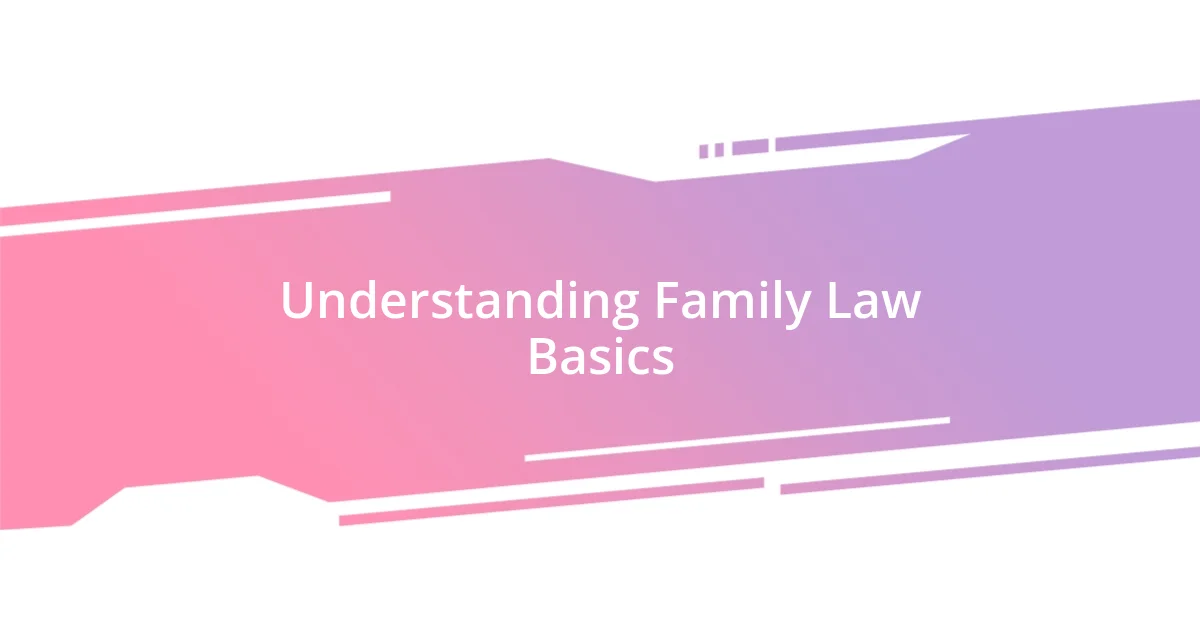
Understanding Family Law Basics
Family law, at its core, deals with the legal issues surrounding family relationships, including marriage, divorce, child custody, and adoption. I remember the first time I encountered a family law case; it struck me how deeply intertwined legal decisions are with people’s emotions. Have you ever thought about how the outcome of such cases can shape not just a family’s dynamics but also individual lives for years to come?
When I learned about child custody arrangements, I felt a profound sense of empathy for parents caught in these situations. The law aims to protect the children’s best interests, but can it ever truly capture the complexities of family love? Understanding how courts assess custody—whether through joint or sole arrangements—showed me that family law is not just about rules; it’s about nurturing relationships.
Another vital element is the division of property during divorce. I was surprised to discover how different states have varying laws on this matter. In my experience, navigating these waters can feel overwhelming, especially for couples in emotional turmoil. It made me wonder—how do individuals balance their financial futures with the heartache of separating lives built together?
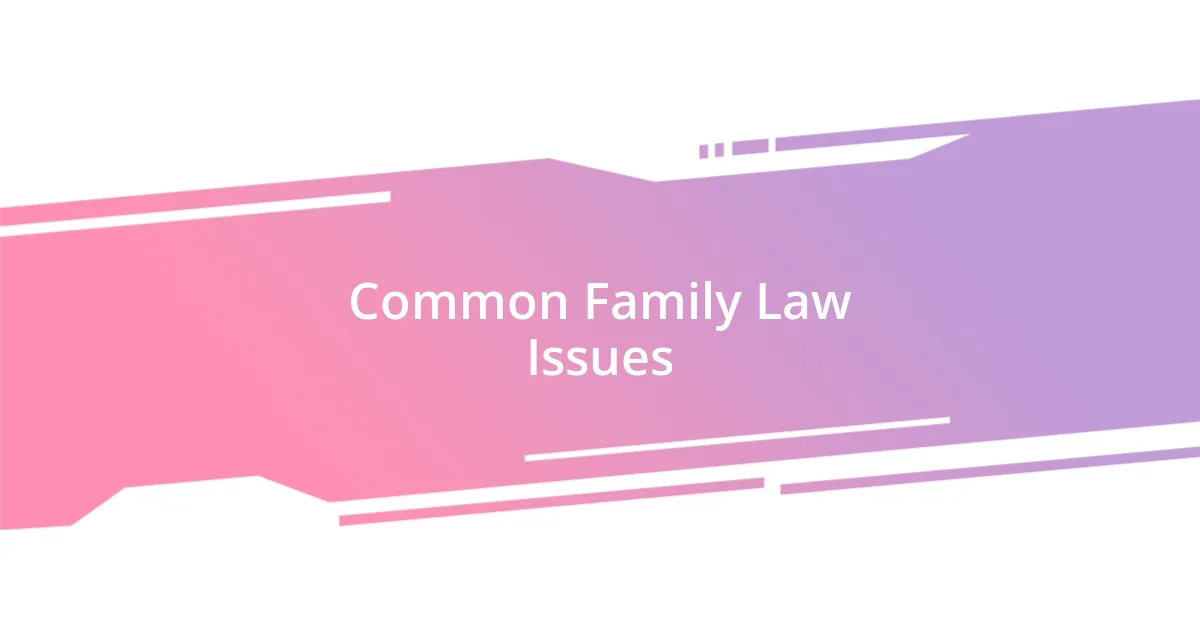
Common Family Law Issues
Family law encompasses a range of issues that can deeply affect people’s lives. One of the most common issues I’ve come across is child custody disputes. I recall discussing a case with a friend who was navigating a difficult custody battle. The emotional strain was palpable as both parents wrestled with the fear of losing precious time with their kids. It’s not just a legal battle; it’s about the potential disruption of family bonds, which can resonate for years.
Here are some of the primary family law issues that frequently arise:
- Divorce: The emotional and financial complexities involved can be overwhelming.
- Child Custody: Determining the arrangement that serves the child’s best interests is often fraught with disagreement.
- Child Support: Establishing fair support payments that accommodate both parental roles can be contentious.
- Adoption: The legal process can be lengthy and emotionally charged as families strive to create lasting bonds.
- Alimony: Discussions surrounding spousal support can create hostility, as both parties seek to secure their financial futures.
Understanding these issues gives insight into the profound impact family law has not just on legal standings but also on human emotions and relationships.
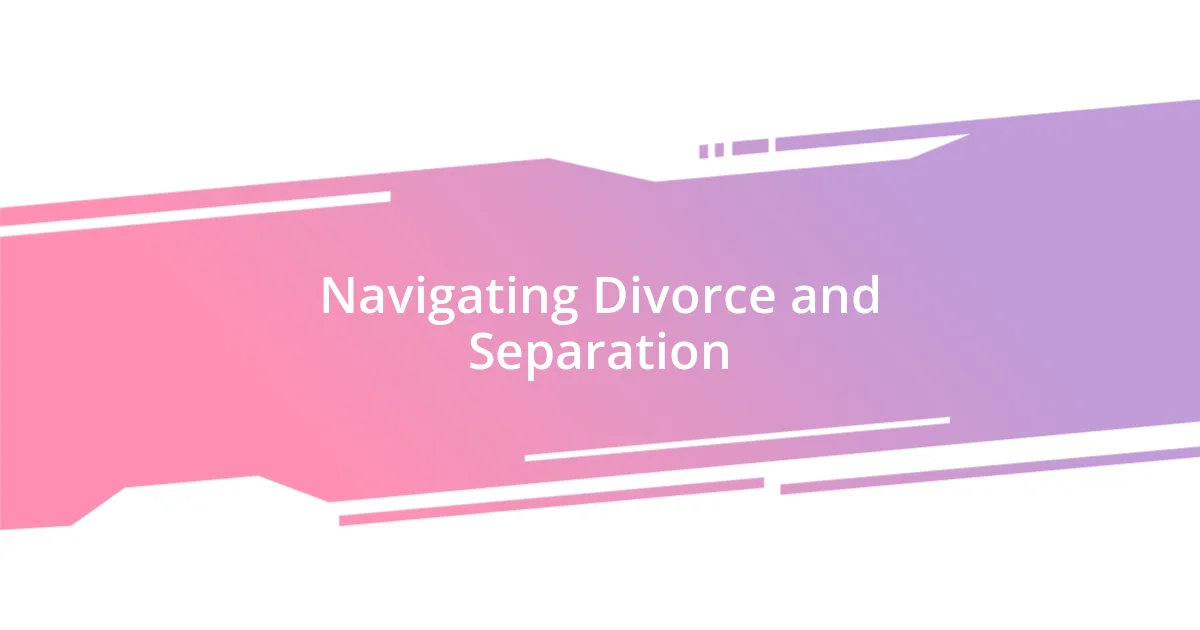
Navigating Divorce and Separation
Navigating the waters of divorce and separation can be one of the most challenging experiences in life. I vividly recall a close friend who went through a divorce; the emotional turmoil was like a storm brewing inside. As they faced a myriad of decisions—from dividing assets to figuring out living arrangements—every step felt monumental. Have you ever experienced a situation where life’s decisions felt as if they were drowning you? That’s precisely how it felt for them, caught in an overwhelming tidal wave of stress and uncertainty.
When it comes to separation, understanding the legal ramifications is critical. The distinction between contested and uncontested divorce was eye-opening for me. In a contested divorce, both parties struggle to agree on terms, often leading to protracted legal battles. In contrast, an uncontested divorce, where both individuals reach mutual agreements, can save time, money, and emotional energy. I remember my initial surprise at how much of a relief the latter could be; it’s like finding an oasis in a desert of complications.
Another aspect I learned is the importance of seeking support, whether legal or emotional. During this turbulent time, I discovered friends and professionals can provide much-needed perspective. Those conversations opened my eyes to the necessity of knowing your rights and options—something I wished my friend had prioritized earlier. After all, the right guidance can make a world of difference, turning a painful process into a more manageable journey.
| Contested Divorce | Uncontested Divorce |
|---|---|
| Definition | Both parties disagree on terms, leading to litigation. |
| Duration | Can take months or even years to resolve. |
| Cost | Typically higher due to legal fees and court costs. |
| Emotional Toll | Often stressful and adversarial, leading to higher emotional strain. |
| Resolution | May require a judge to decide unresolved issues. |
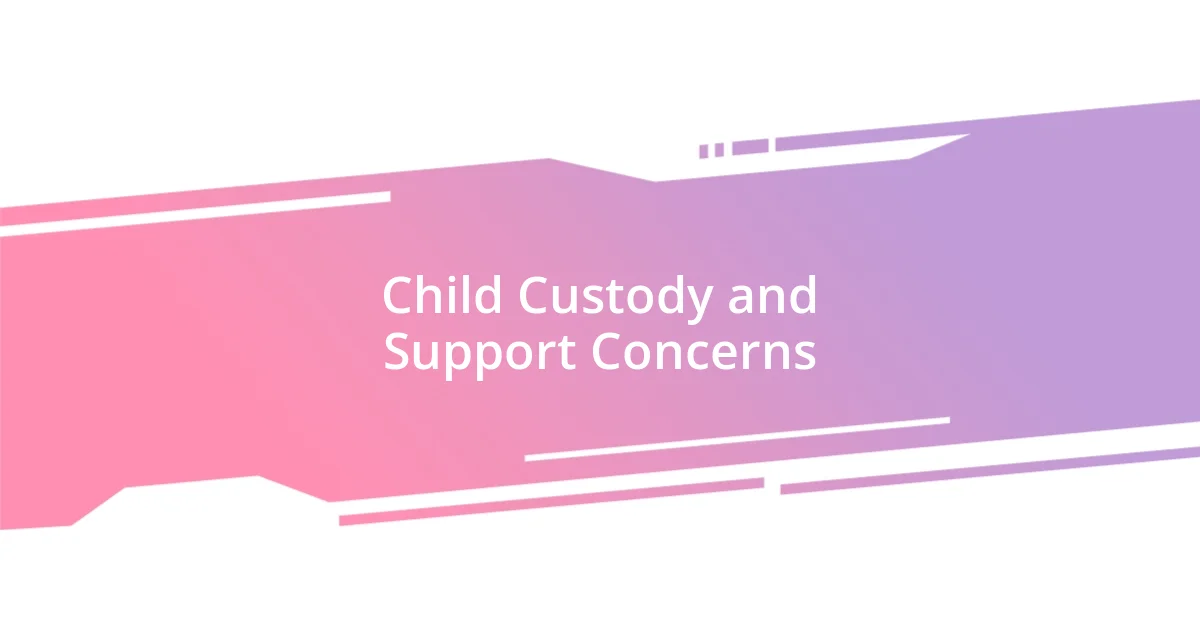
Child Custody and Support Concerns
Child custody arrangements can be a significant source of anxiety for parents. From my experience, it’s often the emotional weight that parents carry, struggling to find a balance between their own needs and the best interests of their child, that complicates these situations. What should ideally focus on the child’s wellbeing often turns into a battleground for reference to past grievances, clouding rational decision-making.
I once found myself in a conversation with a parent who was facing a custody hearing. The dread in their voice spoke volumes; they feared that a ruling could alter their relationship with their child forever. I’ve learned that custody agreements can take various forms, like sole custody, where one parent has primary responsibility, or joint custody, where both parents share this responsibility. It’s vital to understand that these arrangements are not just legal labels but can affect how children perceive their family dynamics long after the decision is made.
Establishing child support can also be fraught with tension. I remember discussing support calculations with a friend who felt that the proposed amount was unfair. These payments are meant to ensure the child’s needs are met, but they often provoke emotions about financial stability and parental responsibility. Why is it that such discussions can turn so contentious? It’s probably because both parents are trying to navigate their own fears of inadequacy while ensuring their children thrive, complicating even the most straightforward discussions.
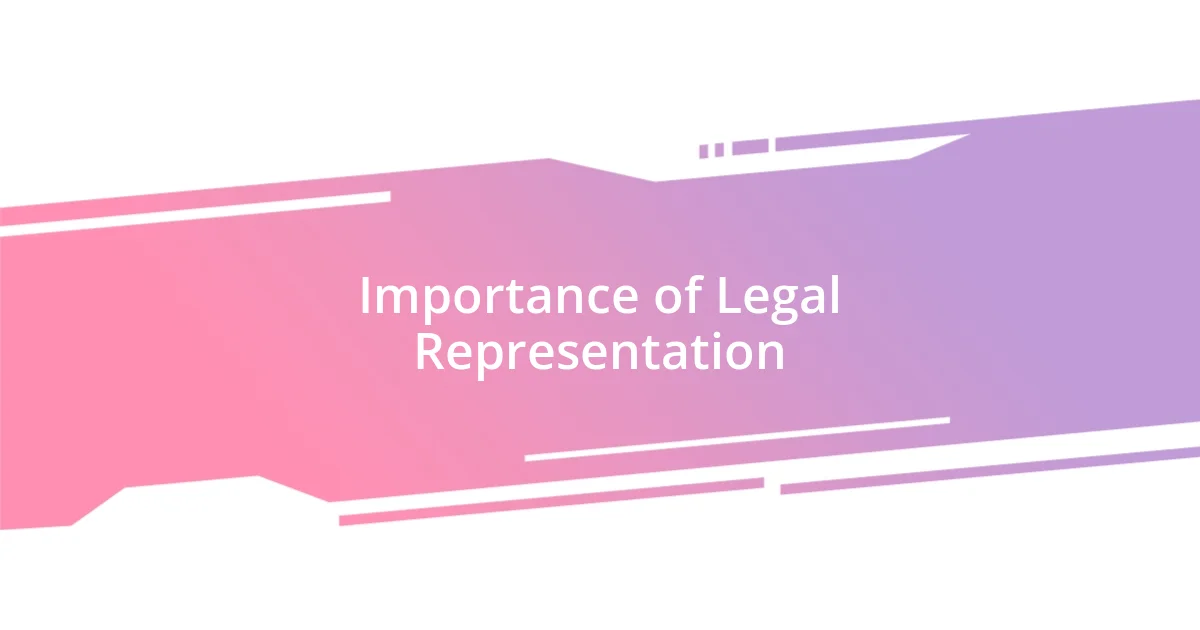
Importance of Legal Representation
When dealing with family law issues, having legal representation is crucial. I vividly recall my own experiences attending a family court hearing. It was overwhelming, and I wasn’t sure what to expect. Watching the lawyer navigate complex legal jargon and advocate for their client made me realize how vital it is to have someone in your corner who understands the law. Without that support, I can’t help but wonder how many people struggle to represent themselves effectively.
Legal representation not only provides knowledge but also emotional support during turbulent times. I remember a friend telling me how relieved they felt having a lawyer who understood their situation. It’s like going into battle with an expert strategist by your side. When emotions run high, having someone who can remain rational and focused on the legal process is invaluable. I often think about those without representation—how daunting that must feel, facing the unknown all alone.
Moreover, the role of a lawyer in crafting negotiations cannot be understated. In my conversations with various professionals in the field, I’ve learned that skilled attorneys can identify potential pitfalls and areas for compromise that a layperson might overlook. Isn’t it fascinating how these negotiations can shape the outcome significantly? I know that many clients may enter discussions thinking they understand their rights, but legal experts can elevate the conversation to ensure that their interests are genuinely protected. It’s this kind of proactive representation that not only minimizes legal risks but also paves the way for healthier future relationships post-separation.
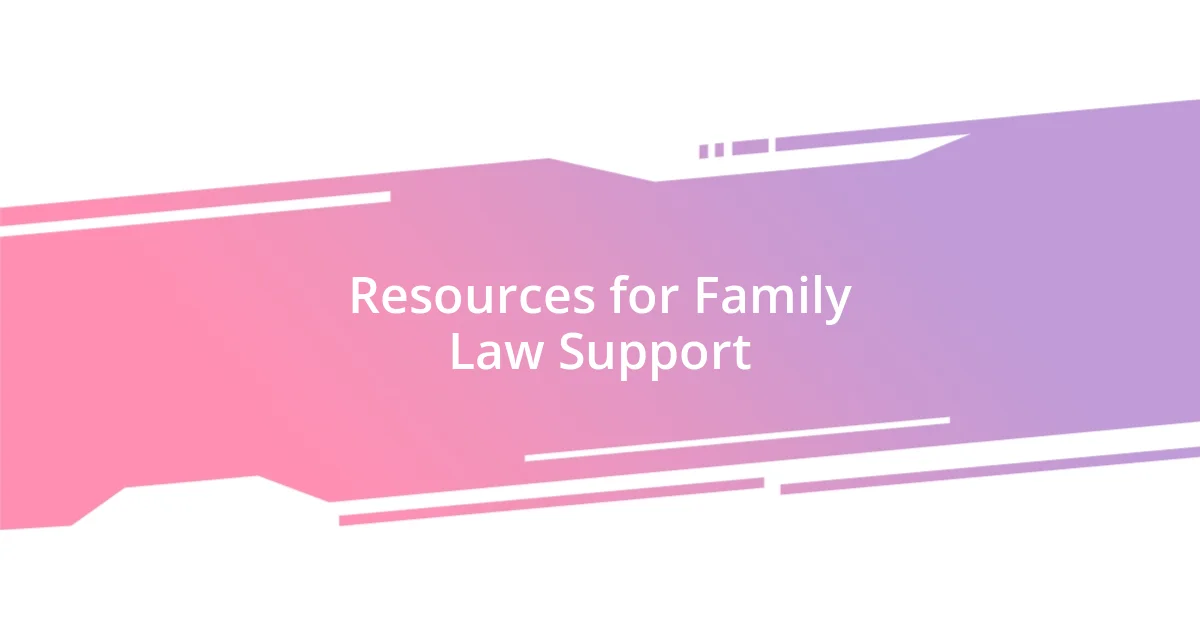
Resources for Family Law Support
Resources for Family Law Support come in various forms, and I’ve found that local legal aid organizations can be a lifeline. When I was navigating some legal complexities, I reached out to one such organization, and their staff guided me through the maze of options available. They not only provided legal information but also connected me with free or low-cost representation, which was a tremendous relief during a financially challenging time. Have you ever felt overwhelmed by the sheer volume of information out there? I know I did, and having professionals ready to help make sense of it all can change the entire landscape of a situation.
Alongside legal aid, community resources like family support groups play a crucial role. I stumbled into a local support group after my friend suggested it, and I was surprised by the warmth and understanding I encountered. Hearing others share their stories helped me realize I wasn’t alone in my struggles. It’s easy to feel isolated during family law issues, but these groups provide both emotional and practical support. Isn’t it comforting to know that others are experiencing similar challenges? That understanding can be incredibly healing and empowering.
Finally, online resources are worth exploring. I’ve often turned to websites dedicated to family law for articles addressing common questions and concerns. One particularly informative site had a section offering sample custody agreements and resources on mediation, which provided valuable insights. Why is it that we often forget the power of a quick search? It’s amazing how a few clicks can open doors to knowledge that not only educates but equips individuals to face their circumstances more confidently. Whether you prefer traditional in-person support or digital information, there’s no shortage of resources available to help you navigate family law issues.
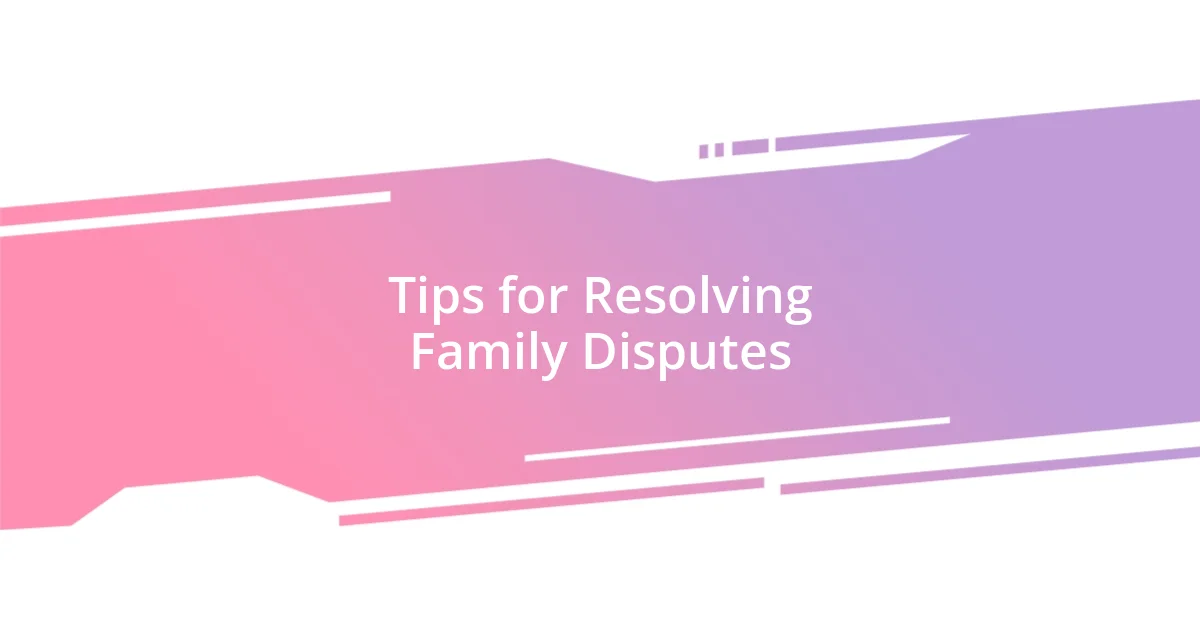
Tips for Resolving Family Disputes
One effective tip I learned for resolving family disputes is to practice active listening. There was a time when I felt my voice wasn’t being heard during discussions, which only escalated tensions. By focusing on truly hearing what the other party was saying, I found that I could respond more thoughtfully. Isn’t it interesting how often we listen just to respond instead of understand? A little patience can lead to breakthroughs.
Another strategy I’ve come to appreciate is seeking mediation before things escalate further. Remember a particularly charged moment when my family faced a major disagreement? We brought in a neutral mediator, and what a game changer that was! The mediator helped us articulate our feelings without the heated emotions taking over. It wasn’t just about finding a solution but also about mending strained relationships. Don’t you think mediators can act as peacekeepers in the chaos?
Lastly, I can’t stress enough the importance of maintaining calm and a respectful tone, especially during heated discussions. I recall a moment when I let frustration get the best of me, and it only drove a wedge further. Taking deep breaths and consciously choosing kindness can diffuse potential conflict. How often have you seen an argument escalate simply because the tone turned sour? I learned that staying calm can keep the conversation productive, turning disputes into discussions.












